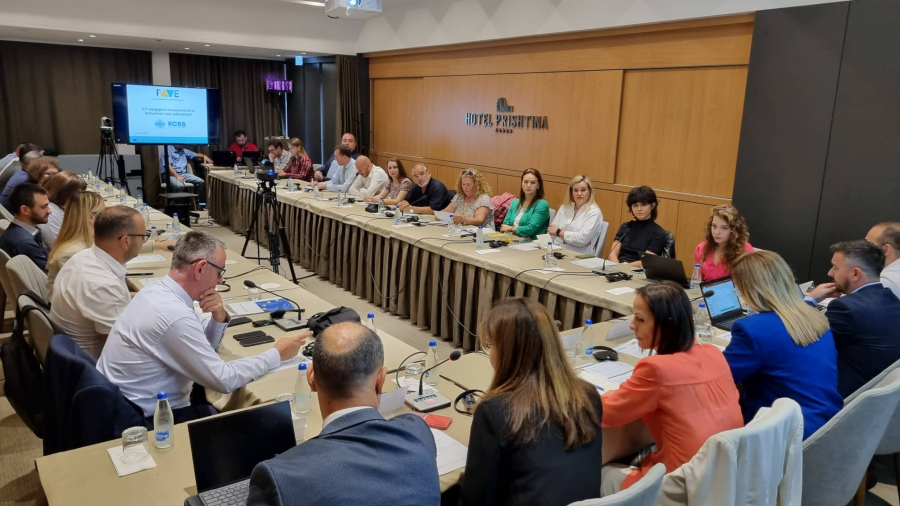8/09/2022

Prishtina, September 8, 2022
The Kosovar Centre for Security Studies (KCSS), in the framework of the EU funded research project PAVE, organized a policy roundtable to present some of the findings and the policy recommendations from the PAVE research to government, civil society and international community. Around 30 people attended the round table, including senior public officials from the governmental institutions and the Kosovo Assembly, representatives of the religious institutions in Kosovo, teachers, experts from the P/CVE community, representatives from the EU Office in Kosovo, representatives from the international organizations such as OSCE, etc.
The round table was organized into three main parts. During the first part, senior researchers from KCSS Ramadan Ilazi and Skender Perteshi introduced the main findings from the PAVE research and concrete recommendations to government, civil society and international community. The second part of the round table included remarks on the findings and recommendations of PAVE research from the panel of the round table consisting of Mrs. Shqipe Mehmeti Selimi from the Committee on Security and Defense Affairs of the Kosovo Assembly and Mrs. Ganimete Gerbovci, Head of the Division for Prevention and Reintegration of Radicalized individuals at the Department for Public Safety from Ministry of Internal Affairs. The third part of the round table involved an open discussion on the findings and recommendations by all participants of the round tables.
The panel members of the round table, Mrs. Mehmeti Selimi and Mrs. Gerbovci, welcomed the recommendations and the findings from the PAVE research, and hailed the quality of the working paper 5. Member of Kosovo’s Assembly, Mrs. Mehmeti Selimi, said that the PAVE report and recommendations should contribute towards policy-making process of the government on preventing and countering violent extremism. Mrs. Gervoci, stated that some of the recommendations concerning online (de) radicalization will be considered in current process of development of Kosovo’s cybersecurity strategy, while other recommendations will be considered in the ongoing process of preparing a new program for reintegration and rehabilitation of the radicalized individuals.
During the open discussion of the round table, the representative from the Islamic Community of Kosovo (ICK) welcomed the report and the recommendations and highlighted the importance of working with media to better organize public debates on religious issues and not to spread disinformation. A former senior official from the Ministry of Education, and a principal of a high school in Kosovo, stressed the importance of the recommendation of the PAVE project to support critical thinking skills among students and introduce a subject on media education in the schools.
Representatives from the international community in Kosovo focused their discussion on the recommendation of the PAVE research that suggests to avoid a securitized approach towards P/CVE and the finding from the working paper 5 on the discourse of the international community on radicalization and violent extremism. The researchers from KCSS noted that Kosovo should not blend policies and strategies of radicalization and violent extremism with terrorism and there should be separate strategies, in order to recognize that radicalization is a complex and mixed process that involves cognitive aspects, as well. The representative of Kosovo Protestant Church, stressed that Kosovo has not yet fully resolved challenges from violent extremism, although significant progress was achieved, and also noted that it is vital for Kosovo to approve the Law for Religious Freedoms which is highly advanced and it is pending approval by Kosovo Assembly.
Another recommendation from the PAVE project that was supported includes the call for the government to decentralize the policies on (de) radicalization and countering violent extremism in order to increase support and empower the municipal authorities. Government officials in the round table agreed to take this recommendation into serious consideration.
KCSS, will follow-up the discussions with the government and also share the full policy brief and offer to support potential integration of policy recommendations into government strategies.